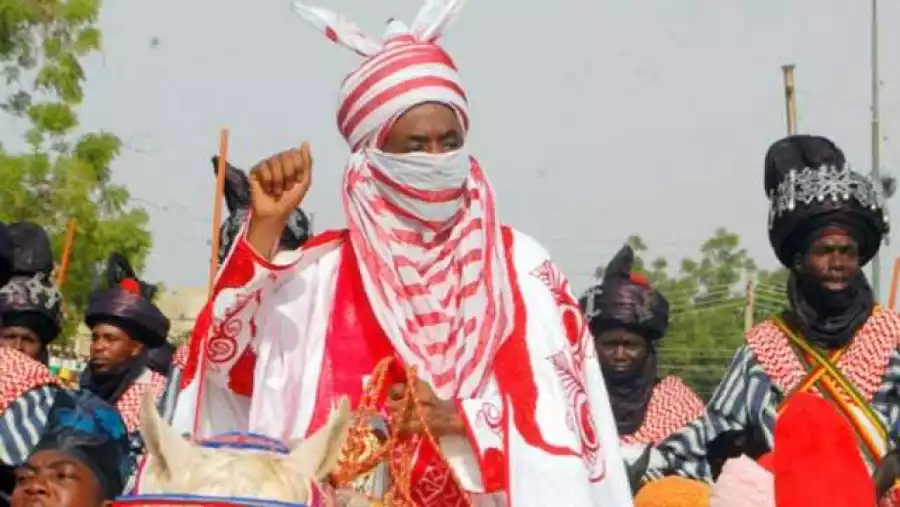Viability of Sanusi’s suggestion on conversion of mosques to schools

Viability of Sanusi’s suggestion on conversion of mosques to schools
A call by the Emir of Kano, Muhammad Sanusi II, that mosques in the North should be converted to schools in order to stem the tide of terrorism, underdevelopment and poverty in the region may seem a bold statement but is it right? IYABO LAWAL and UJUNWA ATUEYI in this report examine the motive behind the proposal.
Ten-year-old Musa Muhammed has a face that should be on a billboard – a billboard bearing a message about endangered children. Aisha, his mother came from Kebbi State and dropped him off at a Quranic School in Kano State when he was seven.
Left to his own devices, he is gaunt, and clad in torn clothes, which haven’t been touched by water in a long time. He is inside a local restaurant, cleaning off the plates of a customer who has just finished eating – with his tongue.
Like Musa, over seven million children in northern Nigeria are in the Almajiri System, according to figures from the National Council for the Welfare of Destitute (NCWD).
That figure is three times the population of The Gambia.
They are lopped off at thousands of Quranic schools that dot cities in many parts of northern Nigeria where they learn five-days in a week, and attend classes four times in a day. They are also expected to earn a living by begging and sometimes provide for their teachers’ upkeep too.
On Fridays, they are let loose on the city where they beg for alms to feed, or run errands. The notorious ones get their preliminary introduction in fundamentalism from rabble-rousing street preachers who introduce them to the terror trade.
Placed in this context, the call for the conversion of mosques to schools by the Emir of Kano, Mallam Muhammad Sanusi II, sounded like the words of a sage. However, there are those who say it is a recipe for chaos.
The former Central Bank of Nigeria (CBN) governor, in an address at the joint convocation of 2,000 teachers held at the Kano Government House, on February 7, regretted that the North has been lagging behind educationally.
Mallam Sanusi challenged northern governors to build a giant remedial college to accommodate all northern candidates, who fail to secure admission into conventional universities and for the use of mosques as schools.
To convince his audience that his ideas were not impractical, Sanusi cited the example of Morocco where this model of education was obtainable. He argued that this remedial institution would improve literacy rates in northern Nigeria, which currently plays catch up to the southern part of the country.
However, the debate about the much-touted educational backwardness of northern Nigeria is often starved of the benefit of a background. Prior to the infiltration of foreign cultures both Western and Islamic, indigenous Nigerians had functional education systems.
There existed well organised ancient city states across the various parts of what is today known as Nigeria. Prior to the arrival of the British colonialists, the Almajiri System was founded to perpetuate Islamic education. Pupils lived with their parents, the schools were within their vicinity, institutional funding was provided and even an inspector reported to the Emir on progress.
“The British invaded the region and killed most of the Emirs and deposed some. The Emirs lost control of their territories and accepted their new roles, as mere traditional rulers. They also lost fundamental control of the Almajiri System,” Professor Idris Abdulkadir, former Executive Secretary of National University Commission (NUC) said.
Abdulkadir further stated, “The British deliberately abolished state funding in respect to the system arguing that, they were religious schools. With loss of support from the government, its immediate community and the helpless Emirs, the Almajiri system collapsed like a pile of cards. Karatun Boko, western education was introduced and funded instead. The pupils now turned, Almajiri together with their Mallams, having no financial support resorted to begging and other menial jobs for survival. This is certainly the genesis of the predicament of the Almajiri system today.”
Scholars argued that the North never believed that education was bad, only the Western kind, which they believed would corrode their values roil their stomachs.
Therefore, administrators in the region bowed to pressure from religious groups and did little to push western education. The consequence is the current system where there are more mosques than schools and millions of young northerners who lack skills that would make them self-sufficient today.
Extremism
The proliferation of mosques in the North and the failure of the Almajiri system have led many to believe that the system has morphed into a fertile ground for recruiting extremists.
“As the system is currently being practised today, lots of the children never made it. Some are lost through violence in the streets and some remain as untrained armies available to anybody poised to foment trouble. They have their own axes to grind against their parents, authorities and the society at large,” Abdulkadir stated.
A large population of illiterates coupled with an army of unemployed northern youths bruising under the weight of a corrupt political system is among the conditions that gave birth to Boko Haram in 2002 in Maiduguri, Borno State, by 32-year old Mohammed Yusuf.
Yusuf, a preacher gave scathing sermons against the government, which resonated with the people who hold a searing grudge against the establishment and Western education. When he was killed by security forces in 2009, hardliners in his organisation led by Abubakar Shekau, led a bloody insurgency whose embers still burn to this day.
This, however, is in sharp contrast with the southern part of Nigeria where though a church is springing up at every block, does not experience any sort of extremism.
It was against this backdrop that Sanusi made the call with an explanation that mosques could serve as alternatives pending when government can provide a conventional school structure.
He said that historically mosques are used for the accomplishment of other things other than worship. They have been used for instructions, meetings, arbitrations, policy planning and education.
Is Sanusi’s call a solution to encouraging education or just a little step in the long way to help northerners in educating their children?
The issue has elicited strong reactions from northern opinion leaders. Second Republic lawmaker, Dr. Junaid Mohammed, called the Emir’s statement “mischievous”, insisting that it will not solve the problem of millions of children begging on the street.
In the same vein, the Chief Imam of University of Lagos (UNILAG), Prof. Murtala Bidmos said the idea is not ideal.
Describing the call as a fire brigade approach to education, Bidmos argued that northern leaders are not showing enough interest in the education of their people.
He said, “The mosque is for worship, training and education so the issue of converting it to schools does not arise. Besides, if you go to any mosque in Nigeria you will see that some weekends, Muslim children are there learning.
According to him, the northerners are excessively rich and can build as much school as they desire if they see education as a priority, he urged those mooting the idea of converting mosques to school to leave the mosques alone.
Also, Head of Department, Educational Foundation, UNILAG, Prof. Ngozi Osarenren, reminded that setting up a proper school requires following la!d down procedures.
“The only option is that they can build schools within the premises if the land is available. That way, we will be looking after the education of the child and the spiritual growth of the child. A mosque is a mosque and a school is a school.
However, Prof Isiaq Akintola differs. He believes the conversion of mosques into primary schools is in order. The Islamic scholar who is the director Muslim Rights Concern (MURIC) said the mosque can serve its primary purpose of worship but can be converted to a center of learning when there is no religious activity.
“Sanusi spoke my mind, Muslims waste space a lot. Our children could be given access to these mosques; when they are not praying, they can be learning there, we can employ teachers and educate our children in western and Islamic education.”
On his part, Imam Ahmad Abdulrahmon, the Chief Missioner, Ansar Uddeen said mosques should not just be a mere place of worship; they can also serve as centers of learning.
“The first known university in the world was a mosque; it has a university attached to it. Activities in the mosque should not be restricted to prayers, learning and teaching is paramount. Education in Islam is total; this is the view of all muslims.
Emir Sanusi is just reminding those who built mosques to revert to the original notion-a mosque is an institution of learning, resource and communication center, place of worship, hospital for the sick and guest house for travellers.
If we do not read extraneous meaning to what he has said, there is no use to spend millions in building a mosque and no active learning is taking place there. Sanusi as an economist is also an Islamic scholar; Islam is a religion that promotes learning and education. You cannot worship Allah without knowledge, wisdom is the lost property of a believer, wherever he finds it, he takes it. “
Sanusi made references to Morocco where such arrangement have yielded results in the past and still yielding results. The Guinness Book of World Records recognises the University of Al Karaouine in Fez, Morocco, as the oldest degree-granting university in the world with its founding in 859 CE.
Al-Azhar University, founded in Cairo, Egypt in the 975 CE, offered a variety of academic degrees, including postgraduate degrees, and is often considered the first full-fledged university.
Contrary to the conflict-prone northern Nigeria, the use of religious centers for places of learning in Morocco and other places have not led to conflicts or destruction. Some believe the problem is far deeper.
It remains to be seen if Sanusi’s suggestions would produce similar outcomes as evident in Morocco and elsewhere in Islamic countries.









![September Babies (2024) [German]](https://www.memesng.com/r/storage.waploaded.com/images/d0e6b38880f79bdb0ce94373f212ef7b.jpg?w=50&ulb=true&ssl=1)
![Kaam Chalu Hai (2024) [Hindi]](https://www.memesng.com/r/storage.waploaded.com/images/39ae6c803d83a68e99498036525922a8.jpg?w=50&ulb=true&ssl=1)
![Article 370 (2024) [Hindi]](https://www.memesng.com/r/storage.waploaded.com/images/8853128cca4151e9f37a5c92d5547ec2.jpg?w=50&ulb=true&ssl=1)














{{comment.anon_name ?? comment.full_name}}
{{timeAgo(comment.date_added)}}
{{comment.body}}
{{subComment.anon_name ?? subComment.full_name}}
{{timeAgo(subComment.date_added)}}
{{subComment.body}}